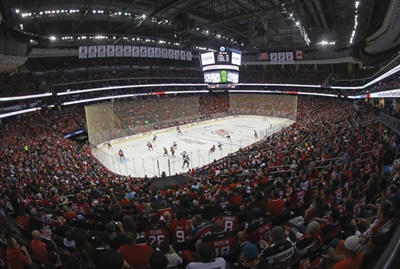Missing the playoffs for the last four seasons would not be a cause for optimism for any team executive predicting future ticket sales.
New Jersey Devils President Hugh Weber acknowledges as much, admitting under most circumstances he’d expect at least a 5 percent drop year after year. But that’s not the case so far in Newark, as the team is seeing almost a 5 percent bump in sales, something Weber attributes to a flex membership plan that was introduced last season.
 |
Fans make a deposit and then, throughout the season, pick the games and seats they want.
Photo by: GETTY IMAGES
|
Under the plan, fans make a deposit into an account, and can choose any game they want to attend, any number of seats from any section, subject to availability. For example, an account holder could choose two club seats for a weeknight game, then four upper bowl seats for a weekend game. The Devils raised the minimum starting deposit for a flex account from $2,500 to $2,750 this season.
So far, it’s been a big draw. Seventy-five percent of the Devils’ new accounts are flex memberships, spending on average 40 percent of what a full-season holder would. While Weber declined to provide the team’s season-ticket base, he said flex memberships make up about 10 to 15 percent of the total. To put the growth in context, the Devils rank second in new sales among nonplayoff teams behind only the Detroit Red Wings, who will play in a new arena next season.
“In a more challenging environment, we think the growth is a result of offering a product people really appreciate, which has helped us outpunch our weight,” Weber said.
Last season, the Devils averaged 15,074 fans per game, just a 1 percent drop from the previous year, which ranked the team 25th in the NHL in average attendance. Since moving to the Prudential Center in 2007, the team’s best attendance was in 2008-09 when it averaged 15,790 per game, representing nearly 90 percent of capacity.
Weber said that when the Devils introduced this membership, they were not sure what sort of buyer the plan would attract, perhaps someone looking to spend less across multiple games. For comparison, two full single-season tickets in the upper bowl cost roughly the same price as starting a flex membership, while two lower bowl tickets cost nearly double that.
However, he said, the plan has mostly attracted those looking for value in terms of flexibility and time. He noted that very few flex membership holders from last season opted into full-season tickets; rather they increased their spend within the membership, often up to five or six times on the minimum amount, spending as much as $10,000-$12,000 a year with the team.
But those with full-season plans largely stayed put, with less than 1 percent opting to switch to the new flex plan.
Weber said this can be a new source of growth for the team. While few season-ticket holders want to upgrade beyond their desired sections year after year, flex members are willing to spend exponentially more.
The biggest challenge the team has faced with flex memberships is making a variety of games enticing. Weber said weekends, high-demand games against rivals and special celebration nights were snapped up quickly, while other inventory remained. The team is looking into offering additional experiences or packages for those games within the flex membership to increase demand.
Susan Cohig, NHL senior vice president of business affairs and integrated marketing, said to her knowledge, no other NHL team has a similar program, and credited the idea developed by the Devils ownership and executive team.
“It enables fans to be committed to the team, but also keeps the revenue with the team and not on the secondary market or other avenues,” she said. “I think it also provides them a tremendous experience what it’s like being part of the club from a membership opportunity, and opens the door to further investment down the road, whether its additional investment in the flex package or a full-season commitment.”
The Devils provide flex members access to the same rewards system that full-season-ticket holders are given, such as access to team events and a dedicated client service representative. Partial-plan holders, which include half-season, 12- and six-game packages, do not receive any of those perks.
Flex members receive priority access to playoff tickets but would be second in line behind full members on seat selection.




